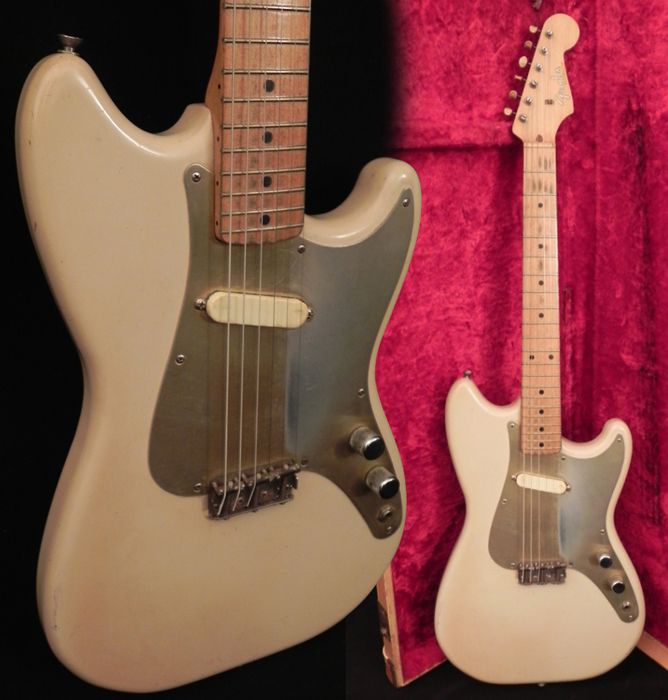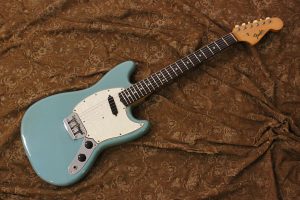
#1964 fender musicmaster 2 pics serial number
It is a true one-owner guitar, complete with the original Fender instruction manual with the serial number hand written inside, as well as an inspection stamp showing the name of the Fender employee who assembled it and another stamp showing the employee who did the final tune-up and test on it before sending it off into the world.
#1964 fender musicmaster 2 pics full
I believe it's a good one! The guitar is a 1970 made during the second full year of production of the Competition Mustang, and the final year a matching headstock was available. In any case, after about a month or calls, e-mails, and relentless searching, comparing, and debating I finally struck a deal on the guitar shown here. but condition and originality were the stumbling blocks, as was finding an early matching headstock model. The color was the easy part, as I discovered that my color preference is the most common. The credentials I was looking for included a matching headstock (which was only offered on early models), a clean, totally original and unmolested example, and lastly.I preferred a "Competition Red" version, as it's my personal favorite of the 3 colors these were offered in. While there were quite a few of these produced between 1969-1972, finding one to meet my criteria was quite a task. After owning several 60's Musicmasters and a Duo-Sonic, I was determined to add a Mustang to my collection of vintage Fenders. This one has been the result of a relentless search for a clean and original early Competition Mustang. The switches work perfectly, no scratchy pots, no issues at all.heck, even the case is in excellent condition, and has served it's duty to protect this gem from harm for over 44 years. This one is a great player, and has very little playwear.

These 65/66 "slab-board" offsets are a cool footnote in Fender history, and are not widely known. Tone gurus often claim a "warmer" tone is achieved with this type of fingerboard construction, and demand for pre-1963 Fenders seem to confirm that many players and collectors prefer them. I own several Fender shortscale offsets from this time period, but only this one has this type of fretboard configuration. It was during this time that demand was great for these shorter scale guitars, and because it was faster and easier to produce/finish a neck with a slab style fretboard, Fender reverted back to this time-tested process for a short time until production demands were met. While Fender did indeed switch over to a "veneer" style laminated fretboard after 1962 on all of their guitars, the slab style fretboard was briefly re-introduced late in 1965 and into 1966 on some (but not all) short scale model guitars, including the Mustang, Musicmaster II, and Duo-Sonic II. Many Fender enthusiasts believe that 1962 was the last year a slab fretboard was produced, but that belief is untrue. It's a one owner, totally original 1966 Duo-Sonic II, with a somewhat rare "slab-board" Indian Rosewood fretboard.

I was actually looking for a 69/70 "Competition" Mustang when I stumbled on this little gem being sold for what I felt was a very good price considering it's amazing condition.

As with so many other guitars in my collection, this one came along almost accidentally. Also planning on getting some of that rust off the tuners and saddles and figuring out what to do with the nut.This is the first and only Duo-Sonic in my collection to date. I'm planning on stripping the finish, smoothing out the body before adding a new nitro finish.

The G string is resting in a minor crater and the A string is sitting a bit deeper than I like: The original nut needs a little TLC (or replacement). Some real-life relic rust on the tuners and bridge saddles: Whoever did the deed got a little eager with the rasp around the curves and edges. Seems like it's all original except stripped daphne blue finish and a '72 neck plate, likely added then it was refinished with some sort of semi-sticky clear coat that now smells of nicotine. The gray bottom pickup is dated 10/26/64 and measures 4.67k - kinda sounds like a '60s Strat's neck pickup! It's a really fun guitar, perfect for working on songs when you're switching between chords and pen and paper, playing on the couch - but it can also hold its own. I couldn't pass up this beat up lil' '64 Fender Musicmaster with a lovely ¾ neck dated Sep 64.


 0 kommentar(er)
0 kommentar(er)
